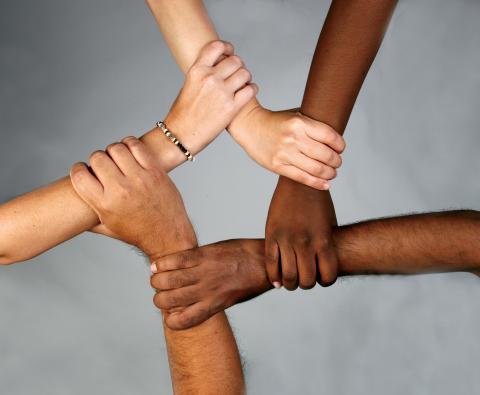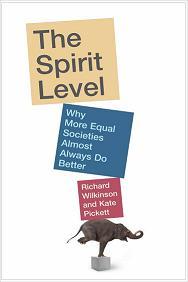Why equal societies almost always do better

The Spirit Level, by Richard Wilkinson and Kate Pickett, confirms that many modern societies are social failures. By Edward O'Hare.
Where has the world gone wrong? These days you don’t have to be a vigilant monitor of current affairs to know that the rates of crime, anti-social behaviour, drug-use, and physical and mental ill-health are rising steadily throughout the developed world. Neither do you have to be an acutely sensitive individual to notice a coldness, an unfeeling disregard, has crept into everyday life.
While our societies grow ever more luxurious and technologically advanced people are increasingly incapable of relating to each other. We appear to be paying for our material wealth with our humanity.
The Spirit Level confirms that this fear is no paranoid delusion but a verifiable fact. Their book demonstrates that, despite their enormous affluence, most modern societies are social failures. The Spirit Level’s central argument is surprising. It states that once a country has reached a certain level of economic growth continued expansion becomes pointless. In direct contradiction to the traditional view that a nation’s social wellbeing increases in proportion to its richness, they claim that what is of real importance is how equally a nation’s wealth is shared between its citizens.
Wilkinson and Pickett are both epidemiologists and like doctors giving a number of patients an emergency medical examination they have assessed the social health of nine of the world’s richest countries, including the UK, Ireland and the USA, to see if their social ills have a common cause. The diagnosis is not good. Inequality emerges from their findings like a virulent disease, destroying countries from within by breeding infections which are multiplying rapidly and proving very hard to cure.
Wilkinson and Pickett present their findings in simple graphs which incontrovertibly prove that inequality is the great affliction of our time and the barrier preventing us from being happy, healthy and more in harmony with our environment and each other. Their straightforward, sober writing style makes the devastating implications of this book even more unsettling.
From racial, gender and sexual discrimination and alcohol, tobacco and narcotic dependency to stress, depression and obesity, The Spirit Level reveals that the degree to which any society experiences these different types of malaise is directly proportionate to its basic inequality.
According to Wilkinson and Pickett, the ruthless competitive ethos of our age has had terrible consequences for trust, friendship and community values. Developed societies are experiencing unprecedented rates of displaced aggression which finds its outlet in urban and domestic violence and workplace bullying.
The gross disproportion between incomes has generated a torrential downward flow of social prejudices, as high earners consider themselves as having the right to belittle those who earn less. The advertising industry has ruthlessly exploited our insecurities and created in many a neurotic need to shop. Poverty has become such a stigma that people are no longer saving for the future but becoming entangled in huge debt in order to be seen as having the trappings of a successful lifestyle.
This book also states unequivocally that if moves are not made to create a greater social balance things will get catastrophically worse. The Bush administration’s despicably callous treatment of those caught in the wake of Hurricane Katrina is held up as an example of how governments are growing to devalue their own people. The global recession is also given as proof that the capitalist system’s placing of power in the hands of a tiny, irresponsible section of society cannot be allowed to go on if the quality of life of all is to improve.
The Spirit Level is the most succinct analysis of the dangers posed by continued inequality and the most clear summation of the benefits increased equality would bring. Richard Wilkinson and Kate Pickett have done an admirable job of collating a colossal amount of vital information. But their book has its weaknesses. There are occasional leaps in their reasoning and the tone of the book is at times condescending. To statements like ‘Living in a poorer area is associated with worse health’ one can only reply ‘Well Duh!’
Unfortunately, the book’s greatest flaw is that it gives us almost no idea of how equality can be achieved. There is the rather woolly notion that increases in employee share-ownership, worker participation in decision making and new kinds of distribution, like digital file-sharing, might eventually turn companies into communities but these ideas are far from concrete.
To be fair, Wilkinson and Pickett do say that their purpose in writing The Spirit Level was to establish beyond question the destructiveness of inequality, not to provide a theory for implementing equality. However, the fact that they don’t offer a definite alternative may only lend weight to their enemies’ argument that none is possible.
In the long run, what might prove most important about The Spirit Level is the way in which Wilkinson and Pickett link their argument for equality with that for environmental sustainability. In their view, equality is one of the prime mechanisms for reducing consumerism, slowing down the depletion of the Earth’s resources and reversing the effects of climate change. They should also be commended for saying what no other social commentators have had the courage to say, that if civilization is going to survive it must take a much simpler form.
In this respect, the authors have the past on their side. Human history, they argue, has been one momentous move towards equality. Instead of seeing the fight for a true social balance as the most intimidating of challenges we should see ourselves as the generation with the opportunity to bring about the greatest revolution ever.

The Spirit Level: Why More Equal Societies Almost Always Do Better
By Richard Wilkinson and Kate Pickett
265 pages
€25
